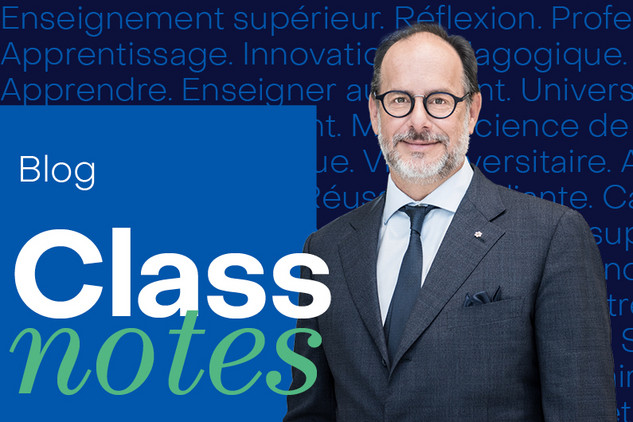Astral travel, in the esoteric universe, occurs when the soul leaves the body and moves through space on its own, unleashed from its corporeal chains. As the Québécois song by Claude Dubois goes: “I look down on the body of my mind, my face upside down, very small, very small.” Wikipedia describes it as an “out-of-body experience,” which is said to be induced by the fear of imminent death, or by transcendental meditation, or by the use of hallucinogenic drugs. I haven’t tried any of those, and I abhor esotericism, but I have vivid memories of moments of distraction in the classroom that brought on such a dissociative state.
It happens without any warning. You bring up a topic for which you aren’t well-prepared. A few poorly constructed sentences later, your brain begins a parallel conversation. On one hand, there’s the lecture that you’re giving, and on the other hand, there’s a little voice in your head that grows increasingly insistent. “I’m not sure I’m making myself clear.” “I have no idea where this sentence is headed.” “I’d better stop before I paint myself into a corner.” Meanwhile, the voice that’s audible to the students gets itself into deeper and deeper water. It rushes headlong, in the hope of finding an escape hatch—still invisible—somewhere in the discussion. Then the little voice starts up again: “What am I talking about? It’s all nonsense! And why am I going on and on?” “Somebody stop me!” A cold sweat. Palpitations. If no one in the class raises their hand to stop you from skidding all over the place, then it’s time for some astral travel! You leave your physical body and float over the students’ heads, observing the pedagogical disaster from on high. It lasts for a few seconds, until you come crashing to the ground, defeated.
It is not a pleasant experience, and there are not many ways to avoid it. You could have a very tight script, one that you never deviate from, but the price is a rigidity that is incompatible with the spirit of discovery that should enliven any learning environment. The classroom is not a stage in a theatre, where the prompter can come to the rescue of an actor suffering from a memory lapse. If all teachers are to some degree actors, improvisation remains their preferred mode of expression. Rather, you have to accept that, sooner or later, you’ll end up on a slippery slope, and hope that the day you start to slide, you’ll have the courage to interrupt yourself, admit without embarrassment that you lost the thread, and start over from the beginning.
When I first started teaching, I approached each class fearing that I didn’t have all the answers. I devoted many hours to preparing myself yet never managed to anticipate everything. There was always one angle that I hadn’t seen or one aspect about which I knew nothing. It got even worse with the arrival of the Internet and laptops in the classroom, which made it possible for everyone to check, in real time, the accuracy of my statements. I didn’t know that a professor has the right to answer “I don’t know; let’s try to find the answer together.” It didn’t occur to me that you could say, at the beginning of a class: “The other day, I was wrong.” “I’ve checked, and this is how you should approach this issue.” I didn’t think that professors had the right to be wrong. Or that you could have good and bad days in this profession, just as in any other.
As a general rule, students are very accepting of professors who are able to acknowledge their own moments of weakness. I say “as a general rule” because I also know that certain group dynamics can make students ruthless, most often towards those who are not firmly established in the profession. Admitting to vulnerability, showing humility, is not always without risk, especially when your employment status is insecure, when you’re young and inexperienced, or have identity markers that thugs and bullies are quick to seize on.
The current climate is perhaps more difficult in this respect than it was forty years ago when I taught my first classes. Then, professors enjoyed an inherent authority that few students dared to challenge openly. Divisive subjects were discussed without the right amount of caution. Few students questioned their own thinking in an open dialogue with the class. Students’ speech was not as free, and they didn’t have a space such as social media to express themselves with in a variety of tones, from the most respectful to the most derisory, aggressive or condescending. But it should not be assumed that this was some kind of golden age of university teaching. The teacher-student relationship has changed for the better. In 1968, the French philosopher Paul Ricœur spoke of this relationship in terms of a duel. There is much to be said about how it has become more complex and enriched. More about that in a future blogpost.
All the same, I remember that the most admired professors, at the time, were those who explicitly placed themselves in a position of openness, respect, and vulnerability, as if they believed—and they really did believe—that time spent in the classroom allowed them to clarify and refine their own thinking as much as ours. Humility, integrity and transparency saved them from more than one astral journey. It seems to me that in this respect nothing has changed.
Daniel Jutras
If you’d like to continue the conversation, please drop me a line.
